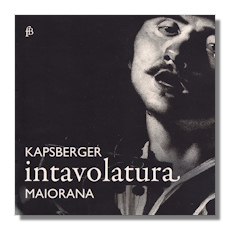
The Internet's Premier Classical Music Source
Related Links
-
Kapsberger Reviews
- Latest Reviews
- More Reviews
-
By Composer
-
Collections
DVD & Blu-ray
Books
Concert Reviews
Articles/Interviews
Software
Audio
Search Amazon
Recommended Links
Site News
 CD Review
CD Review
Giovanni Girolamo Kapsberger

Intavolatura
- Preludio primo and Preludio secondo
- "Com'esser può" à 5 passeggiato
- Preludio decimo and Preludio nono
- Toccata seconda Arpeggiata
- Gagliarda, partita prima e seconda
- Preludio terzo and Preludio quarto
- Toccata seconda
- Corrente seconda
- Ballo primo - Uscita, ballo, gagliarda, corrente
- Preludio undecimo and Preludio duodecimo
- "Ancidetemi pur" à 4 passeggiato
- Passacaglia
- Preludio quinto and Preludio sesto
- Toccata terza
- Toccata quinta
- Battaglia
- Ballo terzo - Uscita, ballo, gagliarda, corrente
- Toccata quarta
- Corrente prima
- Toccata prima
Stefano Maiorana, chitarrone
Fra Bernardo FB1603777
Also available on SACD:
Giovanni Girolamo Kapsberger lived from c. 1580 to 1651. He was a contemporary of Frescobaldi, Schütz, Schein, Scheidt, Tomkins, and Allegri. From an Austrian family living in Italy, Kapsberger was probably born in Venice and is remembered both as a prolific composer and virtuoso of the lute and theorbo (chitarrone). Both these aspects of Kapsberger's work contributed significantly to the development of the lute and theorbo/chitarrone as (solo) instruments.
Early plucked-string specialist Stefano Maiorana was born in Rome and a pupil of several prominent experts in the field including Paul O'Dette; he studied classical guitar at Santa Cecilia. His purpose in producing this exemplary CD on the Fra Bernardo label was specifically to offer a wider view of Kapsberger than perhaps most general listeners (and indeed some non-specialists in the repertoire) may have.
He has succeeded. Although a key facet of the 20 works drawn from Books I, III and IV of "Intavolatura di chitarrone" presented here is variety, after listening to the music, you are also impressed with the composer's perception, gentle insistence on inventiveness and gifts at carrying an idea (thematic and textural) through in such a way that its impact seems inevitable.
The Preludes from Book IV [tr.s 1,3,6,10,13] are quiet, humble reflections – meditations, almost (as Maiorana suggests in his informative booklet which comes with the CD) while the five Toccate [tr.s 4,7,14,15,18,20] are not only more contrapuntal in nature, but also more spirited, upward- and outward-facing. They too, though, have an elegiac quality to which Maiorana's precise yet neither over-delicate nor unduly effusive style of playing is well suited.
Even the dance music included here, courantes, balli, a galliard, are played less as demonstrations and more with an emphasis on delight, not rhetoric. The "Battaglia" [tr.16] is the longest piece here, at almost nine minutes, and could have been turned into an excuse for quirky virtuosity. That's not Maiorana's approach, though. Instead we hear an account full of sensitivity – sympathy even – for the musical and creative world in which Kapsberger was evidently so well at home. There is nothing superfluous, showy or demonstrative. Maiorana starts with technique (even in the extraordinary last five seconds of the "Battaglia"), which rests on a thorough understanding of the idiom. He lets the music inexorably press home its own advantage.
Maiorana's playing also implicitly acknowledges Kapsberger's grasp of form: contrast, development, quotation. But perhaps above all the craft of unself-consciously melding the various components of any one piece in such a way that the whole is greater than its parts. One remains aware of the sonority of the chitarrone (a modern copy by Martin Shepherd of an original theorbo) throughout. And it's closely miked, providing an almost lambent experience; yet nothing cloying or oppressive.
This is a collection of evocative, proud and impressive musical statements from a composer whose work deserves to be better known. By letting the works speak for themselves through his deeply sympathetic and comprehending approach, Maiorana has done the composer a real service. Aware that we are listening to modern performances of inevitably modern conception, we are nevertheless made to concentrate on the very essences of Kapsberger's imagination. Maiorana has the gift of bringing us with him as he explores. Though such exploration is neither experimental; nor falsely empirical. He expands a repertoire and type of music-making that could be misunderstood as 'miniature's or 'minor'. But without over-blowing the music, his playing finds nothing that's not written and wished for by Kapsberger.
The acoustic (of the Sala Capitolare in the Roman church of Santa Maria Sopra Minerva) is warm, fresh and clean. It adds much to our appreciation of the instruments and intricacies of Kapsberger's writing over and above any more generalized pleasure that we may derive from more than an hour of this persuasive music. The liner notes guide the reader through the types of work performed, providing pointers to their context and strengths. If this repertoire is one you enjoy already, you will not be disappointed by the color, dexterity and depth of the playing here. If Kapsberger is new to you, this well-produced CD makes and excellent introduction. A little gem that is recommended without hesitation.
Copyright © 2017, Mark Sealey


















